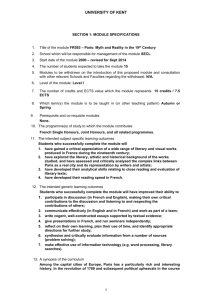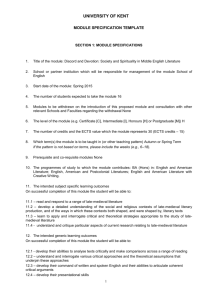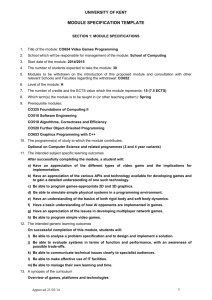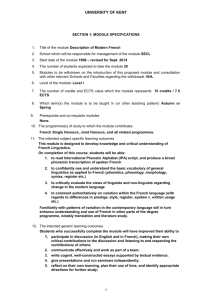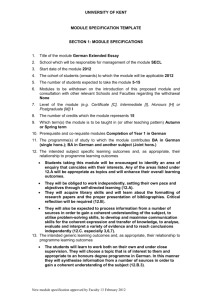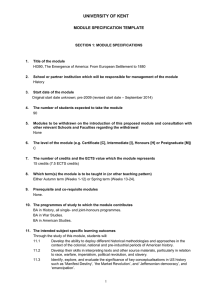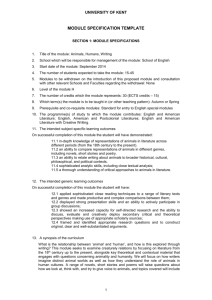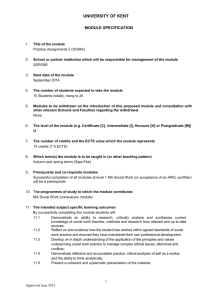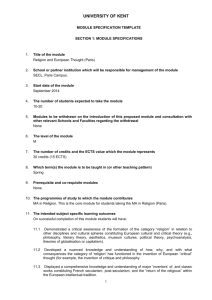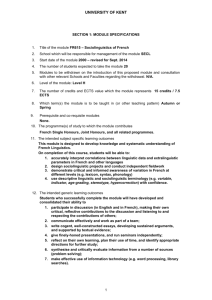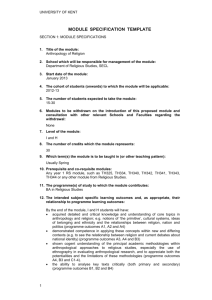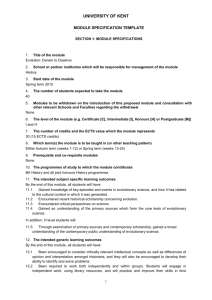UNIVERSITY OF KENT MODULE SPECIFICATION TEMPLATE
advertisement
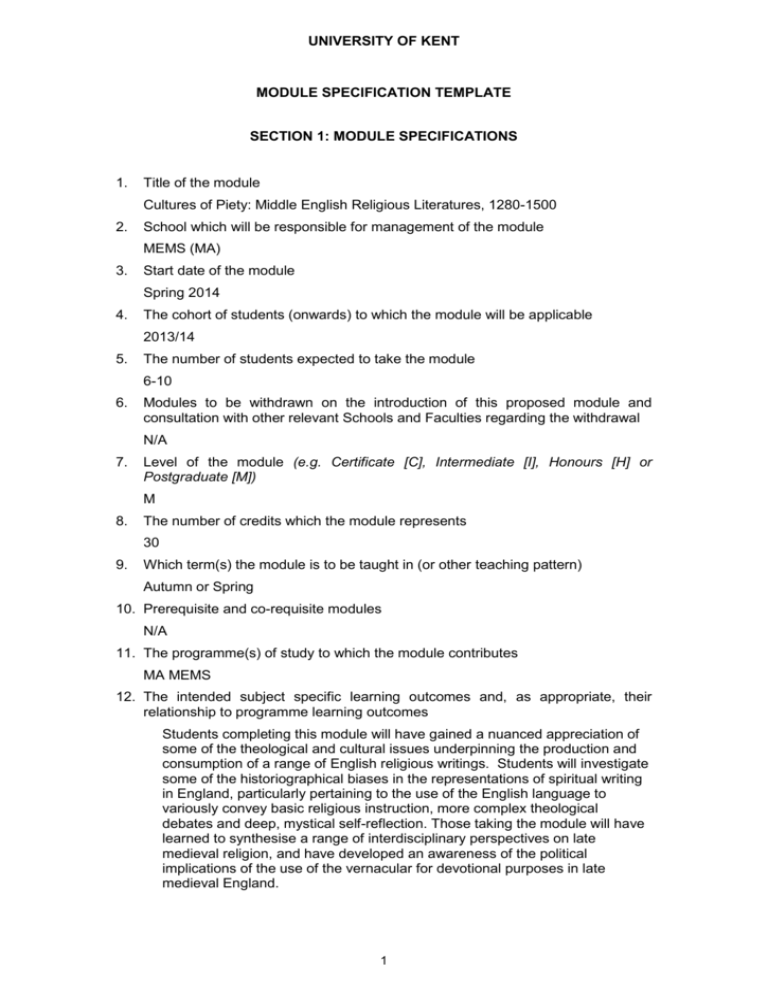
UNIVERSITY OF KENT MODULE SPECIFICATION TEMPLATE SECTION 1: MODULE SPECIFICATIONS 1. Title of the module Cultures of Piety: Middle English Religious Literatures, 1280-1500 2. School which will be responsible for management of the module MEMS (MA) 3. Start date of the module Spring 2014 4. The cohort of students (onwards) to which the module will be applicable 2013/14 5. The number of students expected to take the module 6-10 6. Modules to be withdrawn on the introduction of this proposed module and consultation with other relevant Schools and Faculties regarding the withdrawal N/A 7. Level of the module (e.g. Certificate [C], Intermediate [I], Honours [H] or Postgraduate [M]) M 8. The number of credits which the module represents 30 9. Which term(s) the module is to be taught in (or other teaching pattern) Autumn or Spring 10. Prerequisite and co-requisite modules N/A 11. The programme(s) of study to which the module contributes MA MEMS 12. The intended subject specific learning outcomes and, as appropriate, their relationship to programme learning outcomes Students completing this module will have gained a nuanced appreciation of some of the theological and cultural issues underpinning the production and consumption of a range of English religious writings. Students will investigate some of the historiographical biases in the representations of spiritual writing in England, particularly pertaining to the use of the English language to variously convey basic religious instruction, more complex theological debates and deep, mystical self-reflection. Those taking the module will have learned to synthesise a range of interdisciplinary perspectives on late medieval religion, and have developed an awareness of the political implications of the use of the vernacular for devotional purposes in late medieval England. 1 UNIVERSITY OF KENT 13. The intended generic learning outcomes and, as appropriate, their relationship to programme learning outcomes Students will have improved their ability to produce presentations, individually and collaboratively; they will have put into practice and will enhance the research skills they have acquired as part of their bibliographic, palaeographic and codicological training in the MA’s core modules, MT866 and MT867. Students taking this course will also have improved their close reading skills, and their mastery of Middle English through broad exposure to some of the various Englishes of the late Middle Ages. 14. A synopsis of the curriculum This module explores the supposed renaissance in English devotional writings after the pastoral initiatives of the Fourth Lateran Council of 1215. Students will consider the validity of historiographical models of religious change in this period, examining the emergence of pastoralia, ‘affective piety’ and of the so-called ‘vernacular theologies’ of the late fourteenth and fifteenth centuries. Among the texts to be explored will be extracts from a number of early fourteenth-century pastoral texts (such as Handlyng Synne and The Northern Homily Cycle), from the late fourteenth century – the Showings of Julian of Norwich, and, moving into the fifteenth century, Nicholas Love’s Mirror, The Boke of Margery Kempe and a range of Wycliffite and other ‘suspect’ writings. The literature of religious belief will in turn be situated against a range of manuscript case studies, critical readings, and theoretical studies. 15. Indicative Reading List The Book of Margery Kempe ed. Barry Windeatt (Brewer, 2004). Jocelyn Wogan-Browne ed., The Idea of the Vernacular: An Anthology of Middle English Literary Theory 1280-1520 (Exeter, 1999). The Showings of Julian of Norwich ed. Denise Baker (Norton, 2005). Selections From English Wycliffite Writings, ed. Ann Hudson (University of Toronto Press, 1997) Nicholas Watson, ‘Censorship and Cultural Change in Late Medieval England: Vernacular Theology, the Oxford Translation Debate, and Arundel’s Constitutions of 1409’, Speculum, 70. 4 (1995), 822-864. 16. Learning and Teaching Methods, including the nature and number of contact hours and the total study hours which will be expected of students, and how these relate to achievement of the intended learning outcomes: The module will be taught by ten weekly two-hour seminars; in these seminars students will present regularly on their research findings as part of group and individual research tasks. There will be some additional sessions to look at microfilms of devotional manuscripts in the Special Collections library, to watch films dealing with cenobitic life (eg. Philip Gröning’s Into Great Silence) and to visit the National Gallery in London to view artistic renderings of religious motifs and metaphors that are also found in devotional literature. 17. Assessment methods and how these relate to testing achievement of the intended learning outcomes 2 UNIVERSITY OF KENT The module will be assessed through an essay developed in consultation with the convenor (60%, 3,000 words); performance in research presentations (20%, to be supported by a research diary); and a short essay (20%,1,500 words). The short essay to be submitted in week 7 is designed to allow the convenor to gauge how well the students are engaging with module, and to allow for pointed direction and feedback as they approach the larger essay. The research diary (to be updated weekly) is intended to be an informal reflection of the students’ responses to their reading, of their preparation for both group and individual research tasks, and somewhere to record the research questions which underlie their long essay. Both the learning and teaching and assessment methods relate closely to the intended learning outcomes. They will encourage student-centred exploration and discussion of primary and secondary materials in both their assessed work and in their seminar contributions. Students will be encouraged to develop their collaborative research skills, and to work independently. Students will develop their writing and ability to explain their ideas in informal presentations. 18. Implications for learning resources, including staff, library, IT and space Much of the necessary primary and secondary reading will be contained in a course booklet, and in books the students will be required to buy. It will be necessary to order some supporting books into the library for the benefit of the course, but these will generally be key collections which the library should ideally have on its shelves, regardless. Among the useful works not currently in the library is the 4 volume set ed. by V. O'Hara and S. Saul, A Repertorium of Middle English Prose Sermons (Brepols, 2007). 19. The School recognises and has embedded the expectations of current disability equality legislation, and supports students with a declared disability or special educational need in its teaching. Within this module we will make reasonable adjustments wherever necessary, including additional or substitute materials, teaching modes or assessment methods for students who have declared and discussed their learning support needs. Arrangements for students with declared disabilities will be made on an individual basis, in consultation with the University’s disability/dyslexia support service, and specialist support will be provided where needed. 20. Campus(es) where module will be delivered1 Canterbury If the module is part of a programme in a Partner College or Validated Institution, please complete the following: 21. Partner College/Validated Institution 22. University School (for cognate programmes) or Faculty (for non-cognate programmes) responsible for the programme 1 Required for information purposes only. Changes of campus will not require re-approval of the module specification. 3 UNIVERSITY OF KENT SECTION 2: MODULE IS PART OF A PROGRAMME OF STUDY IN A UNIVERSITY SCHOOL Statement by the School Director of Learning and Teaching/School Director of Graduate Studies (as appropriate): "I confirm I have been consulted on the above module proposal and have given advice on the correct procedures and required content of module proposals" ................................................................ .............................................. Director of Learning and Teaching/Director of Graduate Studies (delete as applicable) Date ………………………………………………… Print Name Statement by the Head of School: "I confirm that the School has approved the introduction of the module and, where the module is proposed by School staff, will be responsible for its resourcing" ................................................................. .............................................. Head of School Date ……………………………………………………. Print Name SECTION 3: MODULE IS PART OF A PROGRAMME IN A PARTNER COLLEGE OR VALIDATED INSTITUTION (Where the module is proposed by a Partner College/Validated Institution) Statement by the Nominated Officer of the College/Validated Institution (delete as applicable): "I confirm that the College/Validated Institution (delete as applicable) has approved the introduction of the module and will be responsible for its resourcing" ................................................................. .............................................. Nominated Responsible Officer of Partner College/Validated Institution Date …………………………………………………. 4 UNIVERSITY OF KENT Print Name ………………………………………………….. Post …………………………………………. Partner College/Validated Institution Module Specification Template Last updated November 2011 5
